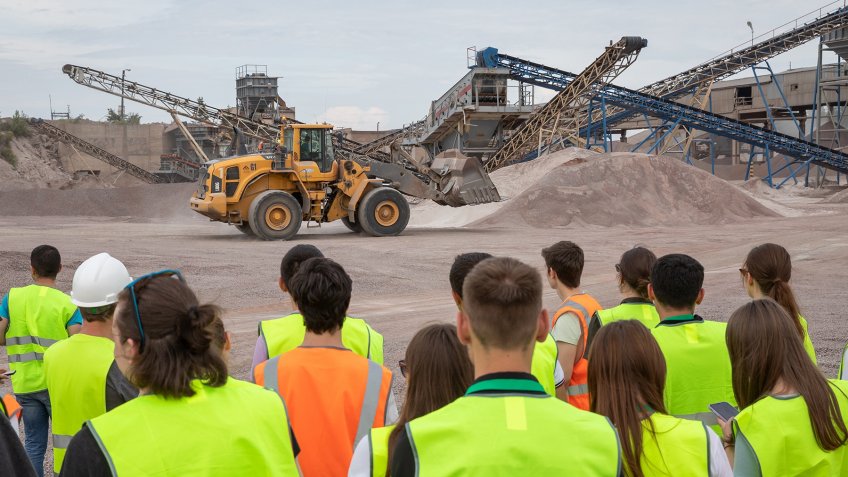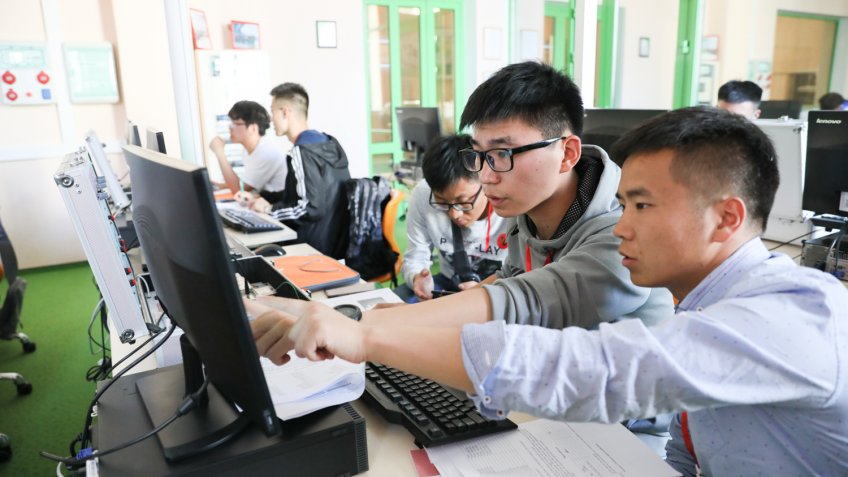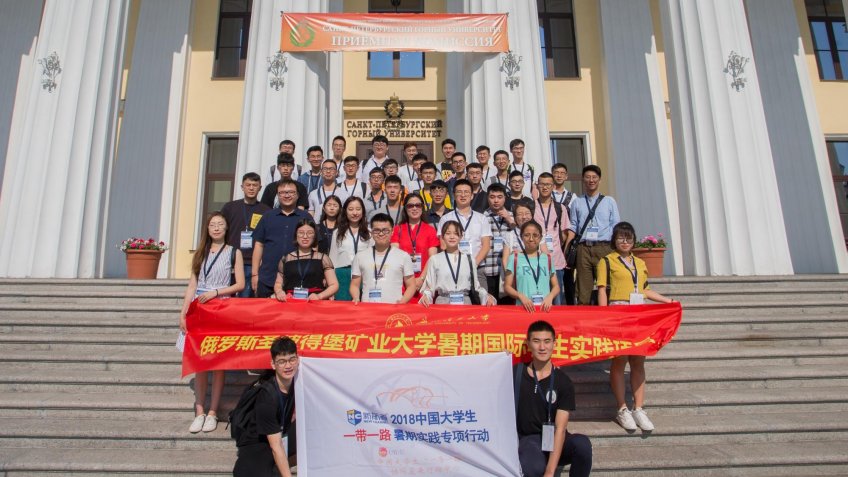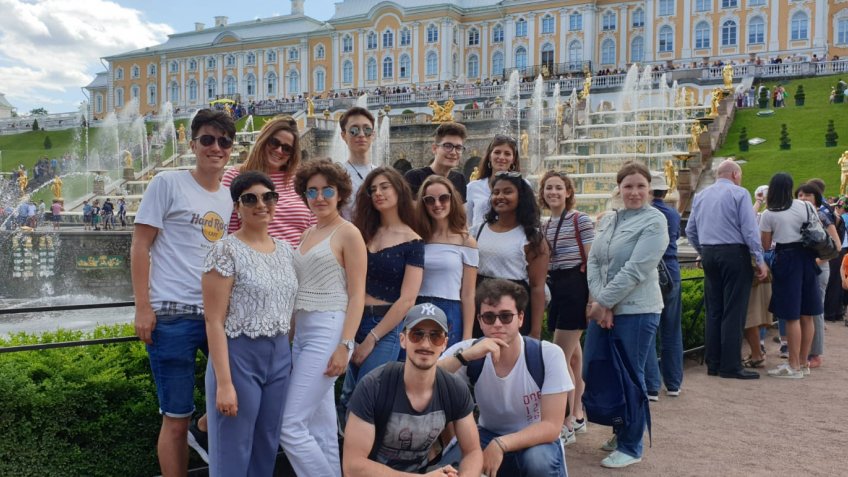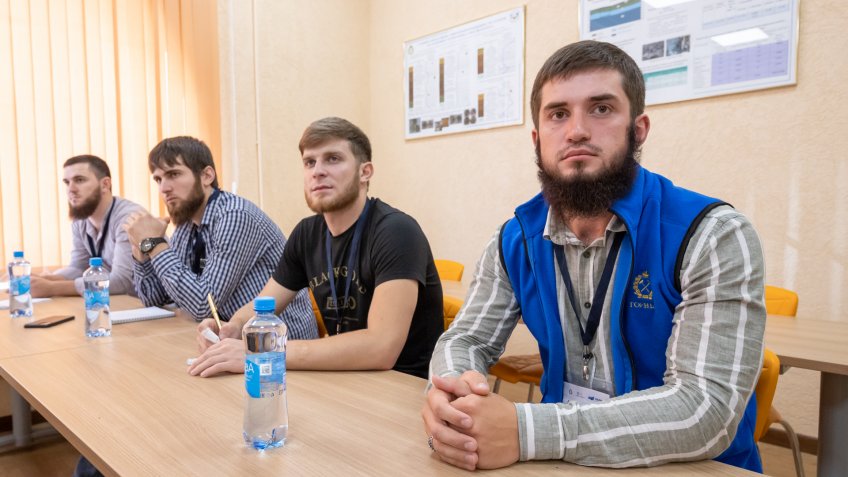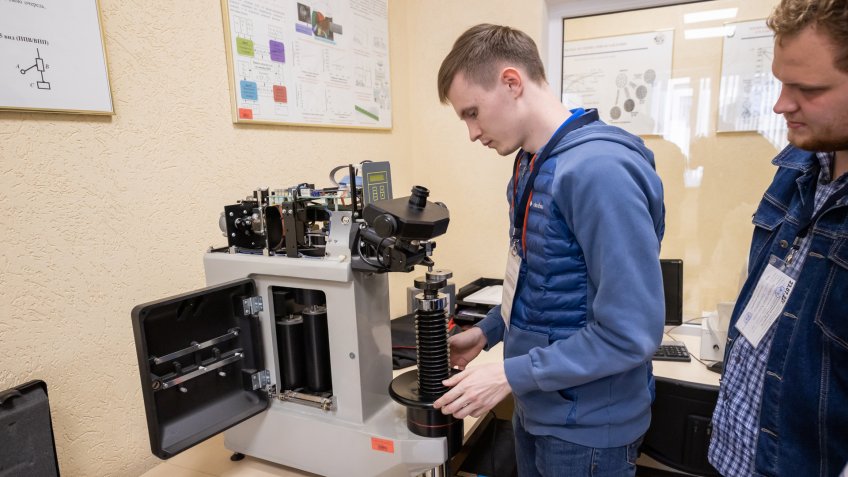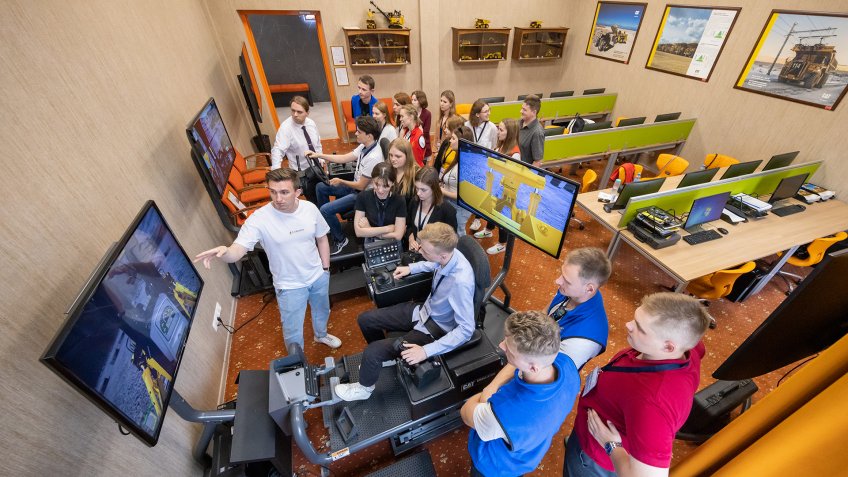
More than 800 students from Belarus, Armenia, Kazakhstan, Namibia, India, China, the DNR, and 40 domestic higher education institutions that are members of the Nedra consortium received new competencies within their framework. All in all, since 2018, when Russia's oldest technical university introduced this format of short-term educational programs into its educational curricula, more than 1,500 people from 32 countries have taken part in them.
If in 2018 only about two hundred people from four countries came to the St. Petersburg Mining University, a year later their number increased to 450, and the university has already received delegations from 17 countries. Guests were offered a choice of about 50 international programs, 27 of which were accredited by the British Engineering Council. And almost all of them were in demand.
So, the representatives of Bologna University were trained in methods of analysis of social and political conflicts, and also psychological aspects of management of conflict situations. The students of the Polytechnic University of Madrid studied in the international educational program "Applied geology". And students at the Lebanese International University chose "Engineering Geodesy: Theory and Practice".
"In Lebanon, particularly at the University of Beirut, we mostly listen to lectures. That's why our students expect practical training at external universities. For me the most interesting part of the program was when we traveled to real companies. We even managed to go down into a real mine of St. Petersburg subway and see with our own eyes how a new tunnel is being built," shared the received emotions three years ago master's student Harb Fuad Anvar.
The delegation from Lanzhou University of Technology had an internship at the Mining University's international summer school, in "Modern Technologies in Energy." Young people from China, in particular, studied the modes and principles of operation of intelligent control systems and became acquainted with the advanced trends in the development of ways of power supply of enterprises and households.
"Thanks to the training we received, we have a clear understanding of what types of energy are used now, and how the energy balance of the planet will develop under different situations in the world. I would like to emphasize the presentation of the material: the high relevance of the given data and statistics, the large number of graphs and diagrams give a good visual presentation, and the constant two-way communication allows us to quickly assimilate the information," Guo Lixian, a master's student, assessed the level of knowledge and skills obtained at that time.
The Italians admitted that they would like to come to St. Petersburg again. And they admired both the Mining University itself and the city on the Neva as a whole: the Hermitage, St. Isaac's and Kazan Cathedrals, the Peter and Paul Fortress, the fountains of Peterhof, and the parks of Pushkin.
"I really liked the multidisciplinary approach to learning, an active combination of theoretical and practical work. In addition, I want to emphasize the relevance of the stated problems. In today's world, it is extremely important to know how conflicts arise, develop, and what consequences they lead to. We have also learned how to resolve them properly, either with the help of a neutral and impartial third party or on our own. The Mining University is by all accounts suitable for the implementation of such international programs. In addition, it is located in an extraordinary, very beautiful city. Of course, I would like to come here again," Bologna University student Andrea Hoyos expressed her hope.
But it didn't happen. The year 2020, due to the coronavirus pandemic, the program totally fell out. And the following year, 2021, the summer schools were held in a mixed, part-time format, as the borders of many countries remained closed. In particular, more than 40 people from Kazakhstan remotely received additional knowledge and skills in the field of design of mining documentation and equipment using software (ARPA).
More than 100 students from domestic universities, members of the Nedra Consortium, as well as universities of Belarus and Armenia came to St. Petersburg in person. For example, Mikayel Martirosyan, a graduate student at the National Polytechnic University of Armenia (NPUA), who simultaneously works as an engineer of the turbine shop at a nuclear power plant, was interested in the "Digital Mining" program.
"When planning its economic development, Armenia emphasizes mining and energy. St. Petersburg University is known as one of the most competent and advanced scientific and educational platforms in this field. The chosen program allowed us to go deeper into the topic of digitalization. At NPUA, only students who study the field of IT are involved in it. But technology is moving forward everywhere, and here I was finally convinced that the introduction of modern digital solutions and software is a key trend for the mineral and fuel and energy complexes. This is not the privilege of individual companies, but a common agenda. Business today needs versatile engineers who understand production processes and their economics, as well as programming and digital analytics skills. This sphere is in its initial stage of development in Armenia and therefore Armenian specialists seek to get relevant knowledge and skills in other countries", said Mikayel Martirosyan.
This year, more than 800 students from Armenia, Belarus, India, Kazakhstan, China, Russia's Democratic People's Republic of Korea, Namibia, and 40 Russian universities-members of the Nedra Consortium have participated in the summer schools of the Saint Petersburg Mining University. Due to logistical difficulties many of those who wished to attend the event could not arrive in the northern capital in person. At the same time, as Vladimir Borzenkov, the general director of the International Competence Centre for Mining-Engineering Education under the auspices of UNESCO, which oversees short-term educational programs of the university, noted, most of them cannot be held remotely. Therefore, some of the students of partner higher education institutions from abroad postponed their visit until next year.
"Only one-third of our educational programs can be conducted online. The rest require personal attendance, since their integral part is visits to the core enterprises, which involve familiarization with the technological chains, or classes on the unique simulators installed at the University of Mining. Thus, we had to reject a number of applications from non-CIS countries, giving preference to the students who are able to come to us personally without any problems," - explained Vladimir Borzenkov.
The delegation from Belarus turned out to be the most numerous. In the first and second waves of summer schools this year at the Mining University, more than 110 people came from the neighboring country. They learned such subjects as "Mining machinery and equipment," "Engineering geodesy" and a number of others.
"It's great to have the opportunity to add to the knowledge we gained at our university by diving deeper into the subject. In two weeks, thanks to the excellent teachers, the well-developed infrastructure of the Mining University and the practice-oriented program, we gained several additional competencies at once. I learned how to operate a dump truck, a loader and a bulldozer on the BelAZ and Caterpillar simulators. In addition, we went to the crushed stone quarry in Vyborg, where we got acquainted with the entire production chain," said Nadezhda Tyapova from the Belarusian National Technical University, a participant of Summer School-2022 "Modern Mining Technologies".
Traditionally, the summer schools of the Mining University are attended by students from the universities that are members of the "Nedra" consortium. This year representatives of 40 Russian universities came to St. Petersburg, including Grozny State Petroleum Technical University named after Academician Millionshchikov.
"This format of short-term educational programs is good, because we can get new knowledge and skills and, in our turn, share our knowledge and skills with students from other institutions of higher education. Our field of study is very diverse, and in order to become a qualified engineer it is necessary to constantly learn, acquire additional competencies, including through sharing experiences with your colleagues," says Shamil Chulaev, who is studying oil and gas engineering in the Chechen capital.
Another student of Grozny's university, Kyamran Parchiyev, noted that he was surprised at the University's infrastructure. He referred to both to laboratories with state-of-the-art equipment and to simulators that imitate the workplaces of mining and transportation equipment operators or real-life production processes. For example, offshore drilling.
"I was happy to get new knowledge within my profession. I was very pleased with the level of professors and teachers who did their best to make our lessons as intensive and fruitful as possible" - said Kamran Parchiev.
For the first time students from the DNR took part in the Mining University summer schools. In their feedback they emphasized that the training program was not only fascinating, but also practice-oriented.
"I was very pleased that it was not a useless waste of hours, as all the knowledge we gained will be useful to us in life in one way or another. It was especially interesting to work in the laboratories, where we applied the knowledge obtained at the lectures. For example, we built the hydraulic system not only in a special computer program, but also at the stand with real parts", - said 2nd year student of DonNTU Maria Alyokhina.
Next year, from the point of view of the participants' geography, the event promises to be much more diverse. For example, the Chinese partners of St. Petersburg Mining University from CUMT and Southwest Petroleum University, which this July could not come to the city on the Neva due to coronavirus restrictions, have expressed the hope that by the summer of 2023 the borders of China will be open again. And there will be no obstacles to the presence of their students in person by that time.
The Lebanese International University, Shiraz University of Iran, and Hanoi University of Mining and Geology have also expressed their willingness to send their delegations to St. Petersburg again. Preliminary applications are also submitted by "newcomers". For example, the University of Zimbabwe, which has recently started to establish academic ties after the visit to St. Petersburg of the Minister of Higher Education, Science and Innovation of the South African country, Amon Murwira.
The National University of La Plata from Argentina is interested in having its students gain additional competencies in ore and carbon resources processing in Russia, and Uruguayan universities are interested in cooperating with Mining University's polar explorers. At the very least, to publish joint scientific articles, and at the most, to organize an international expedition to Antarctica, to Vostok station, where scientists from the St. Petersburg university go every fall.
If logistical chains are restored by next year, the St. Petersburg Mining University summer schools promise to be the most massive in its history. Both in terms of the total number of participants and the number of states they represent.

